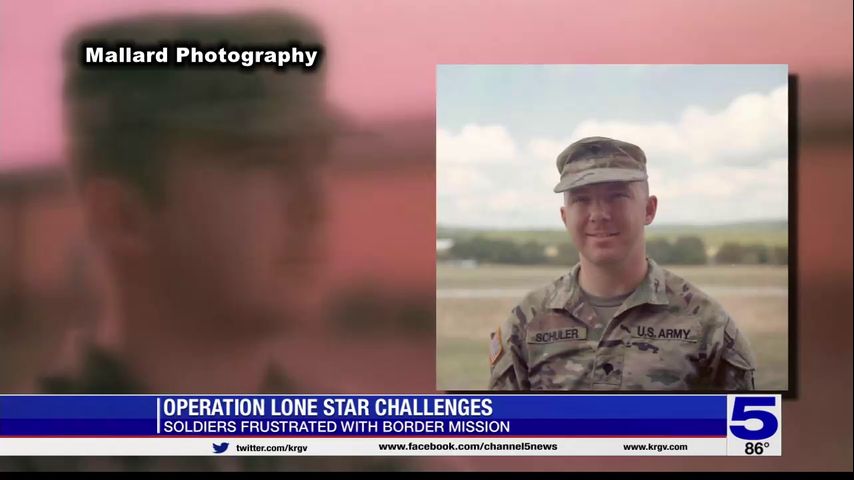Texas Army National Guard member expresses frustration over Operation Lone Star
Last week, Gov. Greg Abbott celebrated the one-year anniversary of Operation Lone Star, the border security initiative aimed at curbing illegal immigration with the assistance of Texas Department of Public Safety troopers and national guardsmen.
Texas Army National Guard Specialist Hunter Schuler is stationed in Del Rio, roughly six hours north of the Valley, and says after just weeks of being deployed here for Operation Lone Star – uncertainty and challenges have become a major concern.
READ ALSO: Landowner, human rights organizations weigh in on Operation Lone Star expansion
While Schuler has more than a decade of experience in the guard, he’s been activated before: First in 2017 for Hurricane Harvey and, before that, for the first Operation Lone Star under Gov. Rick Perry.
Schuler says this mission on the border has been different.
“The prospect of living in a trailer for over a year… that was a lot to take in all at once,” Schuler said, adding that the Texas Military Department has typically put them up in hotels in the past. "The 18-wheeler trailers that they have down there — with just bunk beds stacked three high on either side going all the way down; it’s like 36 beds in each trailer — that was a little startling.”
Schuler says he and other soldiers, who were involuntarily activated and deployed to the border, have experienced pending hardship applications, pay and communication issues, among other problems.
“Every single other issue on the mission stems from that one root issue of being here against your will,” Schuler said. “A lot of these problems would be easier to swallow if you had signed up for this, or volunteered.”
Low morale and other problems have led soldiers from all three branches — the state guard, Army and Air National Guard — to unionize in December. The group continues to enroll fellow soldiers into an already established union, the Texas State Employees Union.
Their actions have caught the Military Department’s attention, with the public affairs department sending out a press release that explains leadership is taking steps to actively improve the living situation.
“We’ve been able to see a pretty clear trend of them, when I say them, of leadership- taking steps to actively improve our living situation. Whether it's being more transparent about the pay issues, or trying to build these semi-permanent structures for us to live in. They’re putting out a weekly newsletter to soldiers now.”
District 20 Texas Sen. Juan “Chuy” Hinojosa (D-McAllen), who’s been appointed to the senate committee on border security by Lt. Gov. Dan Patrick, said he believes 75 percent of the hardship requested was granted.
The news came as a surprise to Schuler, who said there should be more transparency.
“I know a lot of people on the mission who submitted a hardship request and just didn’t receive a response,” Schuler said. “Not even a no or a yes, just nothing, never heard back.”
Hinojosa said as long as he’s part of the border security committee, he’s committed to providing as much transparency and assistance as possible.
“We are more focused on getting through the weeds of finding out how is this money being spent? What are some of the challenges our National Guard troops are facing? What does DPS need? How much money are we spending on equipment? How much money are we spending on technology? Are we utilizing our resources and maximizing those funds so we don't keep on continuing increasing the amount of money being spent on border security,” Hinojosa said.
Both Specialist Schuler and Sen. Hinojosa agree it’s crucial for the federal government to provide funding and a long-term plan to protect the U.S. border.
Hinojosa says during the next committee hearing, the Texas National Guard will be present to testify.
There’s no set date yet on when that hearing will be.





